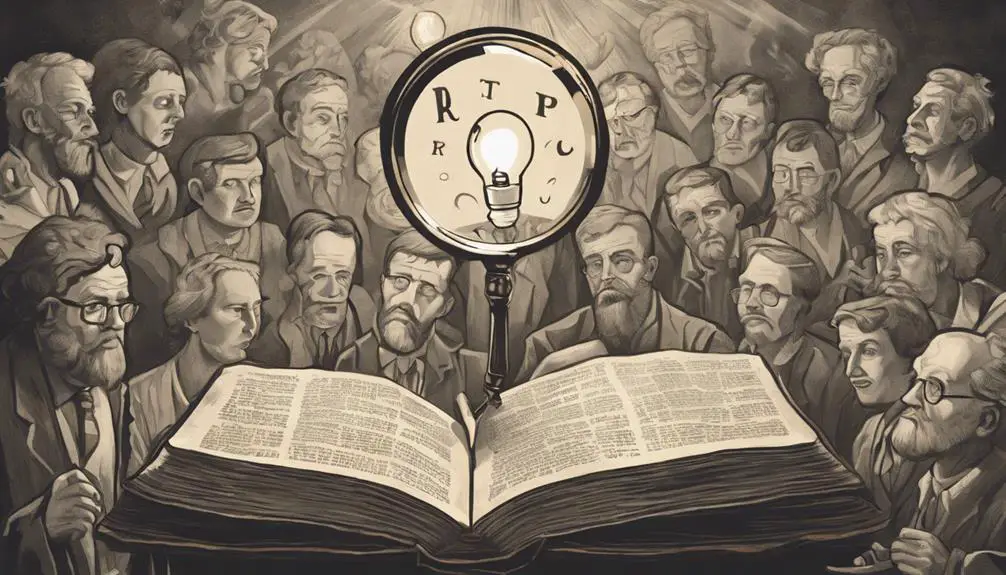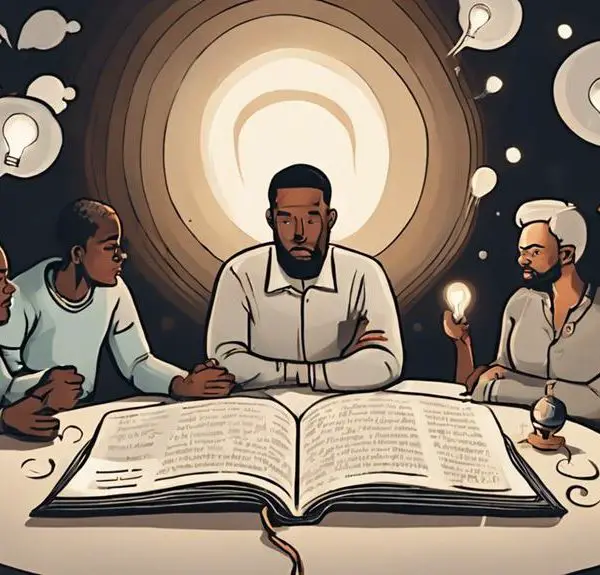Plunge into the depths of 1 Corinthians 15, as we unravel complex themes, answer pressing questions, and explore the mysteries of resurrection and transformation.

1 Corinthians 15 Bible Study Questions and Answers
Isn't it a coincidence that you've chosen to explore the profound teachings of 1 Corinthians 15 at this moment?
This chapter, packed with complex themes like resurrection and transformation, challenges even seasoned theologians.
As you dissect Paul's words, you'll grapple with thought-provoking questions and often debated interpretations.
But don't worry, together we'll unearth the crux of these verses. Are you ready to embark on this insightful journey?
Key Takeaways
- Understanding Paul's teachings on the reality and nature of resurrection in 1 Corinthians 15.
- Debating and reflecting on controversial verses like 1 Corinthians 15:29 and 15:50.
- Applying the teachings from 1 Corinthians 15 to personal life and daily spiritual practices.
- The significance of Christ's resurrection as foundational to the Christian faith and worldview.
Understanding 1 Corinthians 15 Context

To fully comprehend the richness of 1 Corinthians 15, you must first delve into its historical and cultural context. Penned by the Apostle Paul, this letter was written to the Corinthian church, a diverse community in a bustling city renowned for commerce and infamous for immorality. Understanding this backdrop, you'll grasp why Paul's teachings on morality and resurrection were vital. It's also important to remember that Corinthians was a letter, not a systematic theology text, and it addressed specific issues that were troubling the church.
There's also the matter of the Corinthian's cultural context. As Greeks, they were heavily influenced by Hellenistic philosophy, which often denied bodily resurrection, viewing the physical as corrupt and the spiritual as pure. This bias likely contributed to their confusion about resurrection, prompting Paul's detailed explanation in chapter 15. You can't underestimate the impact of these cultural forces as you study 1 Corinthians 15.
This understanding of the historical and cultural context is crucial for an accurate interpretation of Paul's teachings. It's not enough to simply read the words; you must also comprehend the world in which they were written.
Analysis of Resurrection Theme

Delving into the heart of 1 Corinthians 15, you'll find the resurrection theme isn't merely a theological concept, but an assertion that profoundly affects one's worldview and lifestyle. It's a belief that influences how you interpret life, death, and eternity. The resurrection isn't just a historic event or a future expectation; it's a living reality with implications for every facet of your existence.
Analyzing this theme, you'll notice the centrality of Christ's resurrection. It's foundational to Christian faith, affirming Christ's divinity and victory over death. It's not a side issue; indeed, Paul argues that if Christ hasn't been raised, then our faith is futile. But he's not presenting a blind faith. He substantiates his claims with eyewitness accounts, providing a robust evidence-based faith.
Moreover, you'll observe the resurrection's transformative effect. It bestows hope, overcoming the despair death often brings. It promises a glorious future, transcending mortal limitations. It invigorates faith, instilling the courage to face trials.
Interpretation of Paul's Teachings

Building on the understanding of the resurrection theme, it's crucial to examine how Paul's teachings, particularly in 1 Corinthians 15, can be interpreted and applied to your life today. Paul's teachings explore three fundamental aspects: the reality of resurrection, the nature of the resurrected body, and the importance of Christ's resurrection.
Interpreting these teachings requires understanding the cultural context in which they were written, as well as your personal situation. You can experience the power of resurrection by embracing hope, transformation, and dedication to Christ in your daily life.
Consider the following table which breaks down these aspects:
Aspect of Teaching |
Interpretation for Today |
Application |
|---|---|---|
Reality of Resurrection |
Affirmation of life after death |
Cultivate hope and faith |
Nature of Resurrected Body |
Transformation towards glorification |
Embrace change and growth |
Importance of Christ's Resurrection |
Foundation of Christian faith |
Dedicate to Christ-centered life |
Debating Controversial Verses

In your exploration of 1 Corinthians 15, you'll inevitably encounter verses that spark debate and require deep, analytical thinking to unravel their meanings. Controversial verses don't indicate a flaw in the scripture but rather present opportunities for intellectual engagement and deep theological reflection.
One such contentious verse is 1 Corinthians 15:29, where Paul mentions a baptism for the dead. This verse has stirred up myriad interpretations and theological disputes. Some argue it's a literal baptism performed on behalf of deceased individuals, while others contend it's a metaphorical expression of a believer's union with Christ in His death and resurrection.
Then there's verse 15:50, stating that 'flesh and blood can't inherit the kingdom of God'. This verse poses questions about the resurrection, our physical bodies, and the nature of our existence in the afterlife. It pushes the reader to grapple with complex issues of physicality, spirituality, and eternity.
These controversial verses demand careful interpretation and respectful debate. They challenge our understanding and push us to delve deeper into the word of God. They're not stumbling blocks, but stepping stones to a richer, more nuanced understanding of the scripture.
Reflection and Personal Application

How can these profound teachings from 1 Corinthians 15 be applied to your own life and spiritual journey? The answers lie in reflection and personal application.
To help, here's a table where you can jot down your reflections:
Verse |
Reflection |
Application |
|---|---|---|
Verse 1 |
||
Verse 2 |
||
Verse 3 |
||
Verse 4 |
First, take Verse 1. Read it, meditate on it, and write down your personal reflection. Next, think about how it can be applied in your life. Repeat this for the other verses. This practice will allow you not only to understand the scripture deeply but also to incorporate its teachings into your daily life.
Conclusion
In closing, you've gained a deeper understanding of 1 Corinthians 15, its context, the resurrection theme, and Paul's teachings.
You've grappled with controversial verses and applied the teachings personally.
This study has broadened your interpretation, challenged your beliefs, and deepened your faith.
Your journey through this biblical chapter provides a rich foundation for further exploration and reflection, proving that Scripture truly is a treasure trove of wisdom and guidance.



Sign up